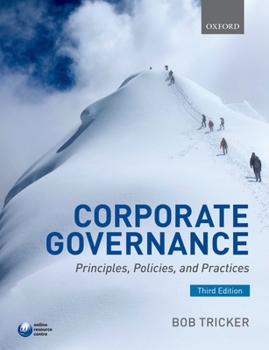Corporate Governance: Principles, Policies, and Practices
Select Format
Select Condition 
Book Overview
Written by the "father of corporate governance", this text is an authoritative guide to the frameworks of power that govern organizations. The third edition covers key developments since the financial crisis, including aggressive tax avoidance, executive pay, and whistle-blowing.The book is divided into three clear parts that firstly outline the models and principles of governance, before analysing corporate policy, codes, and practice. International case studies provide real-world examples and a chapter dedicated to global corporate governance illustrates regulation in such diverse regions as Brazil, Russia, the Middle East, and North Africa. This comparative perspective ensures students are able to evaluate the importance of culture in various attitudes to governance. In addition, self-test questions, with solutions provided at the end of the text, enable the reader to directly test their knowledge and assess their progress throughout.This complete approach ensures students have a fundamental understanding of all aspects of corporate governance and its essential role in real-world business practice.The textbook is accompanied by an Online Resource Centre, which includes:For students * Use the author blog to gain insight into current events in the world of business, economics and finance. The blog is updated by OUP authors and subject experts Bob Tricker and Christine Mallin.* Take your learning further with relevant web links to reliable online content related to each chapter.* Get the most from the case studies in the book by using our additional case study resources to support your online research.For registered lecturers* Additional case studies of varying lengths can be used in class to generate discussion and debate.* Teaching notes support both the case studies and the projects from the book.* PowerPoint slides can be used as a basis for lecture presentations or as hand-outs in class.* Suggested group exercises enable students to put their teamwork skills into practice.
Format:Paperback
Language:English
ISBN:0198702752
ISBN13:9780198702757
Release Date:May 2015
Publisher:Oxford University Press, USA
Length:584 Pages
Weight:2.05 lbs.
Dimensions:1.1" x 7.3" x 9.6"
Customer Reviews
1 rating
Unequaled guide.
Published by Thriftbooks.com User , 15 years ago
Corporate Governance: Principles, Policies and Practices Bob Tricker helped introduce many of us to corporate governance as a field. His 1984 long out of print, Corporate Governance: Practices, Procedures and Powers in British Companies and their Boards of Directors was first to include the phrase "corporate governance" in the title. His definition of the term, even then, was spot-on: "The governance role is not concerned with the running of the company, per se, but with giving overall direction to the enterprise, with overseeing and controlling the executive actions of management and with satisfying legitimate expectations of accountability and regulation by interests beyond the corporate boundaries." Twenty-five years later, Tricker updates his opus. Tricker notes in his introduction that, "Some teachers, particularly those working with students without a lot of business experience, might prefer to build their courses from theory to practice. This is quite feasible, not least since to date the theories of corporate governance, other than a broad concept of agency, have not contributed significantly to its development. The underlying paradigms have been derived from company law and the codes of good practice have emerged as responses to corporate catastrophe and collapse." Thus, readers can see at the outset, Tricker is a realist. Anyone familiar with his work knows he has certainly tried to build the discipline. Corporate Governance: An International Review was his effort to publish cutting-edge research in comparative corporate governance in hopes of building theory and practice on rigorous science. Tricker has often proclaimed the 19th century the entrepreneur's, 20th century management's, and 21st that of governance. We certainly see focus swinging to questions of legitimacy and effectiveness in wielding power worldwide. By the time the 22nd century dawns, corporate power may actually be exercised "in a way that ensures both the effective performance and appropriate social accountability and responsibility... rooted in rigorous and replicable research," as Tricker envisions. If it happens, it will be in no small part due to Tricker's contribution. I was delighted to see my website, corpgov.net, listed as the first of many useful websites at the end of each chapter. Tricker generally takes a very measured approach to his subject, providing the latest advice on principles, policies and practices, balancing all perspectives worth attention. However, when it comes to grounding praxis in the results of research, he is passionate. For example, in discussing the future of corporate governance reporting, he predicts, "The current box ticking approach to simple structural questions will be replaced by performance measures against corporate governance criteria. The reports will also provide independent and objective opinions on the caliber of directors and boards, and on the quality of corporate governance, in the same way that auditors now report





